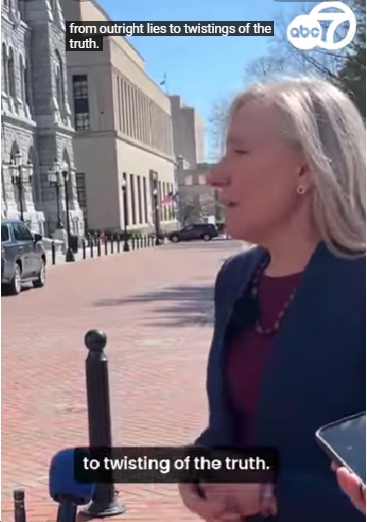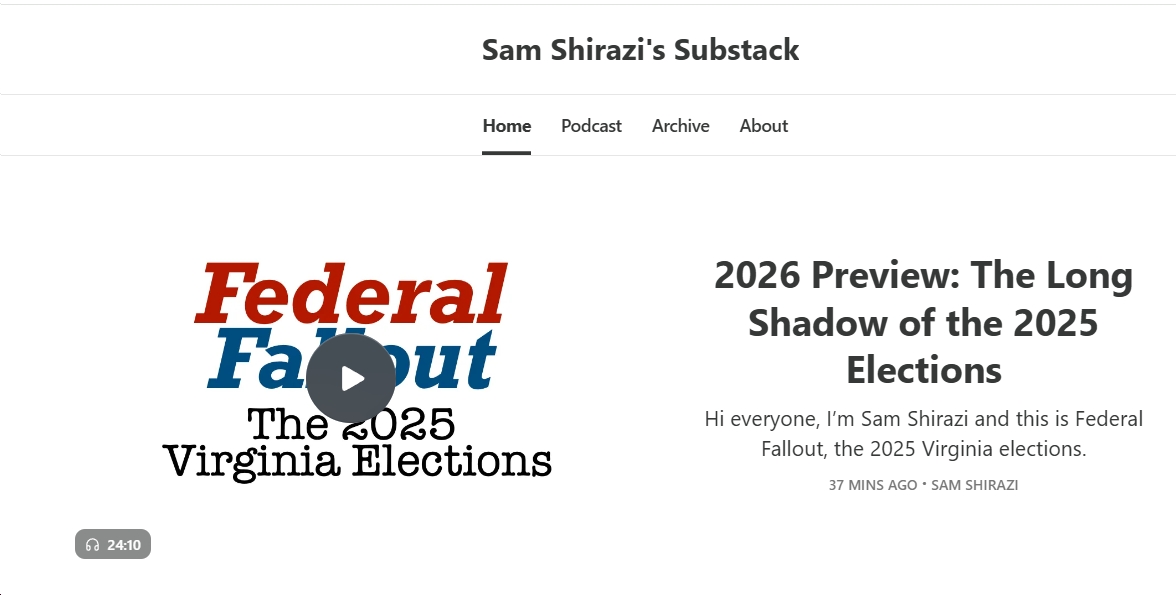At this point, nationally at least, Trump’s approval rating is around 45% and falling. That means Trump’s approval rating is presumably several points lower in Virginia, possibly around 40% or in the upper 30%’s at this point – and again, falling. Of course, we don’t know if this trend will continue through the fall, but right now, the economic outlook is looking worse and worse, which would tend to suggest that the incumbent president’s approval rating will more likely be weaker than stronger a few months from now.
So, assuming Trump’s in the 35%-40% approval rating here in Virginia come early fall, does that mean Winsome Earle-Sears, Jason Miyares, whoever the Republicans’ nominee for Lt. Governor is, and their House of Delegates candidates are all toast? The broader question is, how much does a president’s approval rating matter for the Virginia governor’s race in terms of determining, or at least heavily influencing, the outcome?
I was curious what’s happened in previous governor’s elections, so I went back and looked at the president’s national approval rating and the results of the Virginia elections in 2001 (Democrat Mark Warner vs. Republican Mark Earley), 2005 (Democrat Tim Kaine vs. Republican Jerry Kilgore), 2009 (Democrat Creigh Deeds vs. Republican Bob McDonnell), 2013 (Democrat Terry McAuliffe vs. Republican Ken Cuccinelli), 2017 (Democrat Ralph Northam vs. Republican Ed Gillespie) and 2021 (Democrat Terry McAuliffe vs. Republican Glenn Youngkin). And as far as I can see, there’s not a strong, consistent correlation between the president’s approval rating and the results of the Virginia governor’s election.
For instance:
- In late October 2001, post-9/11, President George W. Bush was at a stratospheric 88% approval nationally, but Democrat Mark Warner won anyway (by a 52%-47% margin) over Republican Mark Earley.
- By late October 2005, Bush’s approval rating had fallen to just 41% nationally (due to the Iraq War to an extent, but even more so to the Bush administration’s disastrous response to Hurricane Katrina), and Democrat Tim Kaine won (over Republican Jerry Kilgore)…by about the same margin as Mark Warner did in 2001.
- In late October 2009, President Barack Obama’s approval rating nationally was 53%, but Republican Bob McDonnell nonetheless crushed Democrat Creigh Deeds by 17+ points.
- And in 2013, Obama’s approval rating nationally had fallen to just 41%, but Democrat Terry McAuliffe still managed to win (albeit, by a narrow margin) over Republican Ken Cuccinelli.
- In 2017, we finally see a pretty strong correlation, as President Donald Trump’s approval rating was at just 38% nationally, and Democrat Ralph Northam won in a 54%-45% landslide.
- Same thing in 2021, where Biden’s approval rating nationally in October was just 42%, and Republican Glenn Youngkin won a narrow victory over Terry McAuliffe.
So, bottom line, there’s not a clear/strong correlation across all these elections between a president’s approval rating and the outcome of the Virginia governor’s election. However, in 2017 and 2021, and also to an extent in 2005, you can see that a president’s low approval rating corresponded with a loss for the Virginia gubernatorial candidate of the same party. In 2001, 2009 and 2013, however, we really didn’t see that take place.
So clearly, there are other factors at work in determining Virginia election results than simply looking at the president’s approval rating. For one thing, it’s HIGHLY noteworthy that in every Virginia gubernatorial election going back decades, with the one exception of 2013, the candidate from the same party as the president in the White House has *lost* the governor’s race. For instance, Republican John Dalton won the governor’s election in 1977, when Democrat Jimmy Carter was president; Democrats Chuck Robb, Gerry Baliles and Doug Wilder all won governor’s elections (in 1981, 1985 and 1989) while Republicans Ronald Reagan and George HW Bush were president; then Republicans George Allen (1993) and Jim Gilmore (1997) won governor’s elections while Democrat Bill Clinton was president; then Democrats Mark Warner (2001) and Tim Kaine (2005) won governor’s elections while Republican George W. Bush was president; then Republican Bob McDonnell (2009) won the governor’s election when Democrat Barack Obama was president; Democrat Ralph Northam (2017) won the governor’s election when Republcan Donald Trump was president; and Republican Glenn Youngkin (2021) won the governor’s election when Democrat Joe Biden was president. So…the only time the pattern didn’t hold was in 2013, with McAuliffe beating Republican Ken Cuccinelli by a narrow margin.
So…yeah, now *THAT* is a correlation, for sure – namely, Virginia going opposite for governor of whichever party holds the White House, basically regardless of approval rating. Why might this be the case? Mostly because, I’d argue, it’s ENTHUSIASM TO TURN OUT AND VOTE of one party’s “base” vs the other’s that determines which side shows up in bigger numbers in an odd-year election, when turnout drops sharply from the presidential election the previous year.
For instance, in 2009, the Tea Party had Republicans in a frenzy, while Democrats were basically asleep – and also frustrated with the Great Recession, the slow pace of progress on health care reform in Congress, etc. In contrast, in 2017, it was *Democrats* who were super-pissed-off at the Trump Republican Party – and remember, angry voters tend to show up, while content/complacent voters tend to stay home – and who turned out strongly in November 2017 to elect Ralph Northam and help Democrats pick up a massive 15 seats in the House of Delegates, almost taking back control of that chamber for the first time in many years. As for 2021, Democrats actually *did* turn out in large numbers, but Republican turnout – fueled by anger at the Biden administration, inflation, COVID, etc – was through the ROOF, near presidential levels in some of the “reddest” parts of Virginia. Which enabled Youngkin to squeeze out a narrow victory in November 2021.
So what might all of this mean for November 2025? In this case, I’m thinking that: a) Trump’s approval rating will likely be very low come this fall, maybe in the mid to upper 30%’s in Virginia; b) Republicans obviously have the White House, so the historical pattern going back decades (of Virginia going OPPOSITE of the party in the White House) *should* hold, unless something really weird happens to cause it not to hold; c) Democrats likely will be far more fired up for Abigail Spanberger than Republicans will be for Sears, both because Democrats are super angry at DOGE, Trump, Musk, federal job cuts, and many other things, while Republicans presumably are content/happy that Trump is in the White House.
All of that, combined, implies that Spanberger’s the STRONG favorite over Winsome Earle-Sears this November. Of course, standard disclaimer inserted here – none of this inevitable, don’t get overconfident or complacent, we have to work to MAKE this happen, etc. But honestly, unless there was a massive Republican advantage in terms of candidate quality or money or something, I don’t really see an obvious way that they could overcome the powerful structural forces working against them.
On those last two points, I’d note that in this election, it’s likely that Abigail Spanberger will, if anything, have significantly more money than Winsome Earle-Sears (at the moment, Spanberger leads Earle-Sears in “cash-on-hand” by a more than 2:1 margin). And, as far as candidate quality is concerned, if anything I’d say that Spanberger has a significant advantage in that regard over Earle-Sears, just in terms of how she comes across, presents herself, etc. Plus, of course, Earle-Sears has a looong list of extreme/out-of-the-mainstream/outrageous/offensive positions and comments, including her recent equivalent of Mitt Romney’s infamous “47%” remarks (in this case, supporting Trump’s decimation of the federal workforce and claiming that it’s no big deal, former federal employees can just find new jobs, etc.). And then there are Earle-Sears’ positions on the issues, from being 100% anti-reproductive-freedom and 100% pro-gun to her many, MANY other extreme views – see here for just a very short list.
Finally, in terms of Republican enthusiasm – or lack thereof – for Earle-Sears, it’s hard to see how her past attacks on Trump, and Trump’s attacks on her will *help* her with her “base” this fall. Now, perhaps Republicans will “fall in line” as they usually do and vote for Earle-Sears. But will the intense, passionate enthusiasm FOR Earle-Sears be there, as it clearly was for Glenn Youngkin in 2021 or Bob McDonnell in 2009? I find that hard to believe, but hey, you never know. Still, if I were the Spanberger campaign, I’d seriously consider reminding Republican voters of Earle-Sears’ past antipathy for Trump, and Trump’s past antipathy for her.
In sharp contrast, I find it very hard to see how Democrats won’t be united this November behind Abigail Spanberger – and turn out in droves to elect her governor. But again, we’ve got to *not* take anything for granted, make sure we turn out in droves, remind everyone we know to the same, etc. And, as I’ve said many times, there’s value in Democrats running up the score in Virginia this November – to elect all three statewide Democrats, to gain as many seats in the House of Delegates as possible, and to send a LOUD and CLEAR message nationally regarding our (intensely negative) feelings about the Trump administration’s DISASTROUS policies, and the Republican Party’s enabling of this mess.



![Saturday News: “Trump’s latest tariff TACO probably won’t make your life more affordable”; “The Epstein Email Cache: 2,300 Messages, Many of Which Mention Trump”; “[MTG] questions if Trump is still the ‘America First’ president”; “Jim Ryan tells all: ‘What did the Governor know, when did he know it?’”](https://bluevirginia.us/wp-content/uploads/2025/11/montage1115.jpg)
![Wednesday News: “The Grand Opening of an American Concentration Camp”; Trump Threatens to Arrest Mamdani; “Poorest Americans Would Be Hurt By Trump’s Big Bill”; [VA] GOP nominees share stage, but not unity”; “Hoos your daddy, Virginia?” (Not Youngkin)](https://bluevirginia.us/wp-content/uploads/2025/07/montage0702.jpg)
![In His Interview with Sam Shirazi, Ben “Not Larry Sabato” Tribbett Says “if I was setting a Las Vegas line [for the 2025 VA governor’s race], I would absolutely put [it] as a starting point in the double digits [in favor of Abigail Spanberger]”](https://bluevirginia.us/wp-content/uploads/2025/04/shiraziben.jpg)











